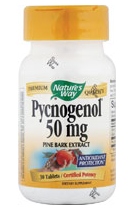Pycnogenol: A Quiet Campaign
Back in early 2007 we talked about Pycnogenol, a supplement taken from pine bark extract (a European pine called the Landes Pine). Since then, you haven’t heard a lot about Pycnogenol in migraine circles. However, that is not a sign that the research has stopped.
 |
As a matter of fact, I was surprised when, a few days ago, my doctor actually recommended it. That’s right, an MD – he recommended a natural supplement for pain.
Now most of the research lately has not been specifically in the area of migraine. And the research has not always been as helpful as we might like – using careful, standardized procedures to really nail down the uses of Pycnogenol.
But the interest certainly continues, and the studies continue to suggest that this is a useful supplement. Although studies have been done regarding everything from blood pressure to erectile disfunction, there are some main benefits of the supplement which continue to emerge.
Pycnogenol is probably best known as an antioxidant – one of the best available. Antioxidants provide a number of benefits to the body by fighting the oxidative damage that happens in the body, impacting you through issues like diabetes, heart disease and cancer.
It’s also known as an anti-inflammatory, which could help stop pain associated with inflammation due to migraine and other types of headache.
Skin health, eye health, heart health, men’s health, women’s health – Pycnogenol is now suspiciously included in hundreds (yes, hundreds) of products, including specialty foods and beverages, supplements, and even cosmetic products.
Though some of these may be an excuse to up the price for something you’re getting from your veggies anyway, there seems to be little doubt that Pycnogenol does provide significant benefits to the body, and may become more and more useful in the treatment of specific conditions.
Such as chronic pain, including migraine.
Thinking of giving it a try? Nature’s Way is a good standardized brand which recommends taking 50mg for every 50-60lbs of body weight for 1-2 weeks, then halving your dose to 50mg per 100-120lbs of body weight. Most adults can try 100mg per day after the initial 1-2 weeks.
However, be sure to talk to your doctor, specifically if you’re already dealing with heart problems.
Pycnogenol supplements are available from Nature’s Way, Source Naturals, and various other brands. Check with amazon.com to compare prices
.

29 September 2011 @ 12:39 pm
Any idea if Pycnogenol is OK to take with MAOIs?